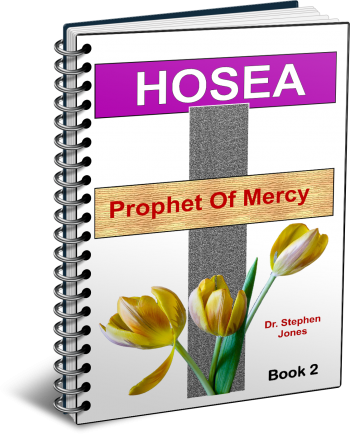Latest Posts
View the latest posts in an easy-to-read list format, with filtering options.

Hosea's failed marriage was a prophetic type of God's failed marriage with Israel. Hosea's harlot wife, Gomer, was named to represent Israel, because Gomer was the official name which the Assyrians called Israel. Her divorce and subsequent redemption shows the mercy of God.
Category - Bible Commentaries

Because of Israel’s religious mixture of idolatry and Mosaic worship, judgment was to come upon them. Hosea 9:6 says,
6 For behold, they will go because of destruction; Egypt will gather them up, Memphis will bury them. Weeds will take over their treasures of silver; thorns will be in their tents.
Israel will be forced to leave the land, “because of destruction” (shode, “ruin, devastation, robbery, oppression”). With their towns and homes in ruins, they will have no choice but to find another place to live. “Egypt will gather them up,” or literally, “rake them up” like a pile of leaves or debris. Memphis was a city in Egypt, containing the sepulcher of Osiris. It was the Necropolis of Egypt, the Cemetery of Egypt. Hence, Hosea says, “Memphis will bury them” among their idolaters.
Their silver, or wealth, will be replaced by kimmoshe, “weeds,” but a specific type of useless, thorny nettle by that name. Its root word (verb) means “to sting.” These useless nettles “will take over their treasures of silver.” More literally, they will dispossess, or seize, their desire, or the object of their desire (machmad) of silver. Hosea paints a word picture of Israel’s wealth being replaced by worthless stinging nettles.
Finally, Hosea says that a chowach, “thorn or thorn bush,” will grow in their tents. No one would want to sleep next to a thorn bush. These metaphors all lead to the same conclusion: Israel will no longer be able to live in the land of Israel but will be forced to leave.
Hosea 9:7 concludes,
7 The days of punishment have come, the days of retribution have come ...
The deportation and scattering of the House of Israel is due to divine punishment and retribution for the idolatrous worship being performed in the land. Of course, most of the people themselves thought they were innocent. They disagreed with Hosea and with God’s analysis of their religious practices. If they had agreed with God, they might have repented.
But it is important to know that the Israelites did not consider themselves idolaters in the way we normally think of them. Most of them knew that idols were just physical objects. They worshiped the person or god behind each idol. The idol merely represented an unseen god, and it helped the people to visualize the god behind the object. Nonetheless, it was a violation of the Second Commandment to make no graven images representing Yahweh. Yahweh appeared to them only as fire (Deut. 4:15), continually changing form, but always the same in nature.
Hosea 9:7 continues,
7 … let Israel know this! The prophet is a fool, the inspired man is demented [shaga, “mad, crazy, raving lunatic”], because of the grossness [rove, “greatness, abundance”] of your iniquity, and because your hostility is so great.
Israel’s prophets probably resented Hosea’s description of them. They had many prophets in the land, but most of them had subordinated their gift to fleshly interests. Hosea did not doubt their inspiration, but attributed it to another spirit.
How did they get such a spirit? It came upon them because of their inner iniquity and their outer expression of hostility (or hatred) of the laws of God. Sin is the evidence of iniquity in the heart. The purpose of God is to replace iniquity with His own character by writing His laws on our hearts. Hence, the evidence of this New Covenant purpose is that we begin to become lawful in our works and attitudes.
Hosea 9:8 says,
8 Ephraim was a watchman with my God, a prophet; yet the snare of a bird catcher is in all his ways, and there is only hostility in the house of his God.
The NASB renders this verse to say that “Ephraim was a watchman.” The KJV reads, “the watchman of Ephraim,” which might be more accurate. There is no indication that either Joseph’s son Ephraim nor Ephraim as a tribe was ever known as a watchman (or prophet). It might be that Hosea was referring to himself as a watchman to Ephraim—that is, to Israel as a whole, and that His prophetic ministry contrasted with the raving lunatics who were inspired by their iniquity.
The Wycliffe Bible Commentary adopts this view, saying this about verse 8:
8. The watchman of Ephraim is probably to be identified with Hosea, the true prophet. The verse is difficult as it stands. Bewer suggests the reading, ‘The prophet is the watchman of Ephraim, the people of my God. The snare of a fowler is on all his ways, enmity in the house of his God.’ The true prophet faithfully declares the word of God and meets active opposition from the blind leaders of Israel, including her false prophets.”
Other translators differ, however, in their opinions, believing that Hosea was picturing Ephraim (or Israel himself) as a hostile watchman and as a “bird catcher” seeking to ensnare others. This opinion is found in Rotherham’s The Emphasized Bible, where he adds a thought to verse 8:
8 The watchman of Ephraim [should have been] with my God…
Ferrar Fenton renders it:
8 Ephraim keeps a look against God!—his prophets lay traps in his paths and destroy in the house of his gods.
Young’s Literal Translation reads:
8 Ephraim is looking away from My God….
Hosea’s wording is somewhat obscure, making it difficult to know precisely what he means. Most likely, Hosea was not suddenly referring to himself as a true watchman-prophet, but was rather speaking of those who were inspired by their heart iniquity. So my conclusion is that the flow of denunciation against the false prophets is not interrupted or contrasted with a true watchman or prophet, but is rather a continuous list of examples of evil things that were being done.
The prophetic fools were called as watchmen of Ephraim, but they were looking in the wrong direction. The implication is that the watchmen of Ephraim were pointing to incorrect causes of the coming captivity. If judgment came, they said, it was because they were not worshiping their false gods sufficiently; it was because they had not given enough money to the false priests; it was because they had not set up enough idols in their houses in honor of God. Because the “birds” (Israelites) were misdirected by prophetic fools, they failed to avoid the snare and were about to be caught in it.
Hosea 9:9 says,
9 They have gone deep in depravity as in the days of Gibeah; He will remember their iniquity, He will punish their sins.
The prophet was referring to the incident in Judges 19-21. The sin in the tribe of Benjamin had caused the near destruction of the entire tribe. In that story, a certain Levite was traveling and decided to spend the night in the town of Gibeah (Judges 19:15). One of the residents saw him setting up camp in the street, and knowing that there were dangerous men in town, he invited him into his home for the night.
While they were having a good time of fellowship, some corrupt young men of the town pounded on the door, shouting, “Bring out the man who came into your house that we may have relations with him” (Judges 19:22). The householder pleaded with them not to “commit this act of folly” (Judges 19:24), but to take the concubine instead. The presumption was that it would be less bad to violate the concubine heterosexually than to commit a homosexual act.
These young men apparently were bisexuals, and such things were tolerated and openly practiced in Gibeah with no fear of judgment. This story was included to illustrate the main theme of the book, which is expressed in the last verse. Judges 21:25 says,
25 In those days there was no king in Israel; everyone did what was right in his own eyes.
In other words, the people had disregarded the law of God in favor of their own conscience or fleshly desire. This story and others were presented by Samuel, the author of the book of Judges, as evidence showing how men could not be trusted to follow their own conscience. The conscience is man-made and therefore carnal, based almost entirely upon the prevailing culture of the day, unless it is changed by the revelation of the word of God.
Hosea, then, appeals to the people in his own time, telling them that their depravity was “as in the days of Gibeah.” By this time, Israel had had many kings, so they had some semblance of law-enforcement, but yet they had come to disagree with the laws of God. The prevailing corruption of culture in Israel had made them lawless from God’s point of view, because they were following their own laws which they believed were good and right.
Therefore, just as the tribe of Benjamin had been destroyed except for just 600 men on account of the sin of Gibeah, so also was Ephraim about to be destroyed. The irony is that the Levite whose concubine had been violated and killed in Judges 19 lived in “the hill country of Ephraim” (Judges 19:1). In that story, Ephraim had been the victim of the crime. But in Hosea’s day, Ephraim had become the perpetrator of lawlessness.
The divine law mandates equal application of the law. Since Ephraim had judged Benjamin in the story of Gibeah, now Ephraim was to receive equal treatment at the hands of the law. This principle is seen clearly in Jesus’ warning in Matt. 7:1, 2,
1 Do not judge, lest you be judged. 2 For in the way you judge, you will be judged; and by your standard of measure, it will be measured to you.
So Hosea tells Ephraim that they were to receive the same measure of judgment that they had meted out against Benjamin some centuries earlier. As for the actual sins being committed, the prophet speaks more clearly in the rest of the chapter.